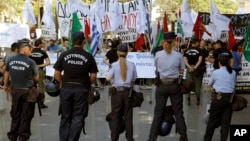LONDON —
The Cypriot parliament approved an international bailout Tuesday in a very close vote, with just over half of lawmakers voting in favor. The "yes" vote lines Cyprus up for a range of austerity measures.
Of 56 lawmakers, 29 voted in favor of the bailout and 27 voted against.
The approval secures a $13 billion loan from European nations and the International Monetary Fund. And, according to the Cypriot government, it saves the island from the threat of an imminent default on its debts.
Tuesday's vote comes after more than a month of haggling over the fate of Cypriot finances.
The deal that was eventually reached with international lenders makes Cyprus responsible for raising $17 billion. Spending cuts and tax hikes are in the pipeline. And the island has agreed to shut down its second largest bank and make major reforms to its largest. Depositors with over $130,000 in savings will incur major losses.
The deal has been deeply unpopular with many both inside Cyprus and overseas.
On Tuesday hundreds of protestors were outside parliament.
Haris Hadjipavlou, a citizens' group activist, voiced his anger at those lawmakers voting in favor of the deal.
"All the members of parliament, who are thieves, we want the police to arrest the thieves that are inside the house of parliament and not us," he said. "We are working people and that have been stolen of our money."
Antonis Antoniou, a civil aviation officer, was also at the protest. He said the deal would be detrimental for Cyprus.
"They steal our people's money and not only stealing, I mean destroying the whole country," he said.
The economy of Cyprus has been deeply impacted by the eurozone's now long-running economic woes, especially the economic crisis in Greece.
Without securing the international loan, Cyprus risked defaulting on its debt and potentially leaving the eurozone.
Its economy is officially forecast to shrink by 8.7 percent this year.
Of 56 lawmakers, 29 voted in favor of the bailout and 27 voted against.
The approval secures a $13 billion loan from European nations and the International Monetary Fund. And, according to the Cypriot government, it saves the island from the threat of an imminent default on its debts.
Tuesday's vote comes after more than a month of haggling over the fate of Cypriot finances.
The deal that was eventually reached with international lenders makes Cyprus responsible for raising $17 billion. Spending cuts and tax hikes are in the pipeline. And the island has agreed to shut down its second largest bank and make major reforms to its largest. Depositors with over $130,000 in savings will incur major losses.
The deal has been deeply unpopular with many both inside Cyprus and overseas.
On Tuesday hundreds of protestors were outside parliament.
Haris Hadjipavlou, a citizens' group activist, voiced his anger at those lawmakers voting in favor of the deal.
"All the members of parliament, who are thieves, we want the police to arrest the thieves that are inside the house of parliament and not us," he said. "We are working people and that have been stolen of our money."
Antonis Antoniou, a civil aviation officer, was also at the protest. He said the deal would be detrimental for Cyprus.
"They steal our people's money and not only stealing, I mean destroying the whole country," he said.
The economy of Cyprus has been deeply impacted by the eurozone's now long-running economic woes, especially the economic crisis in Greece.
Without securing the international loan, Cyprus risked defaulting on its debt and potentially leaving the eurozone.
Its economy is officially forecast to shrink by 8.7 percent this year.




